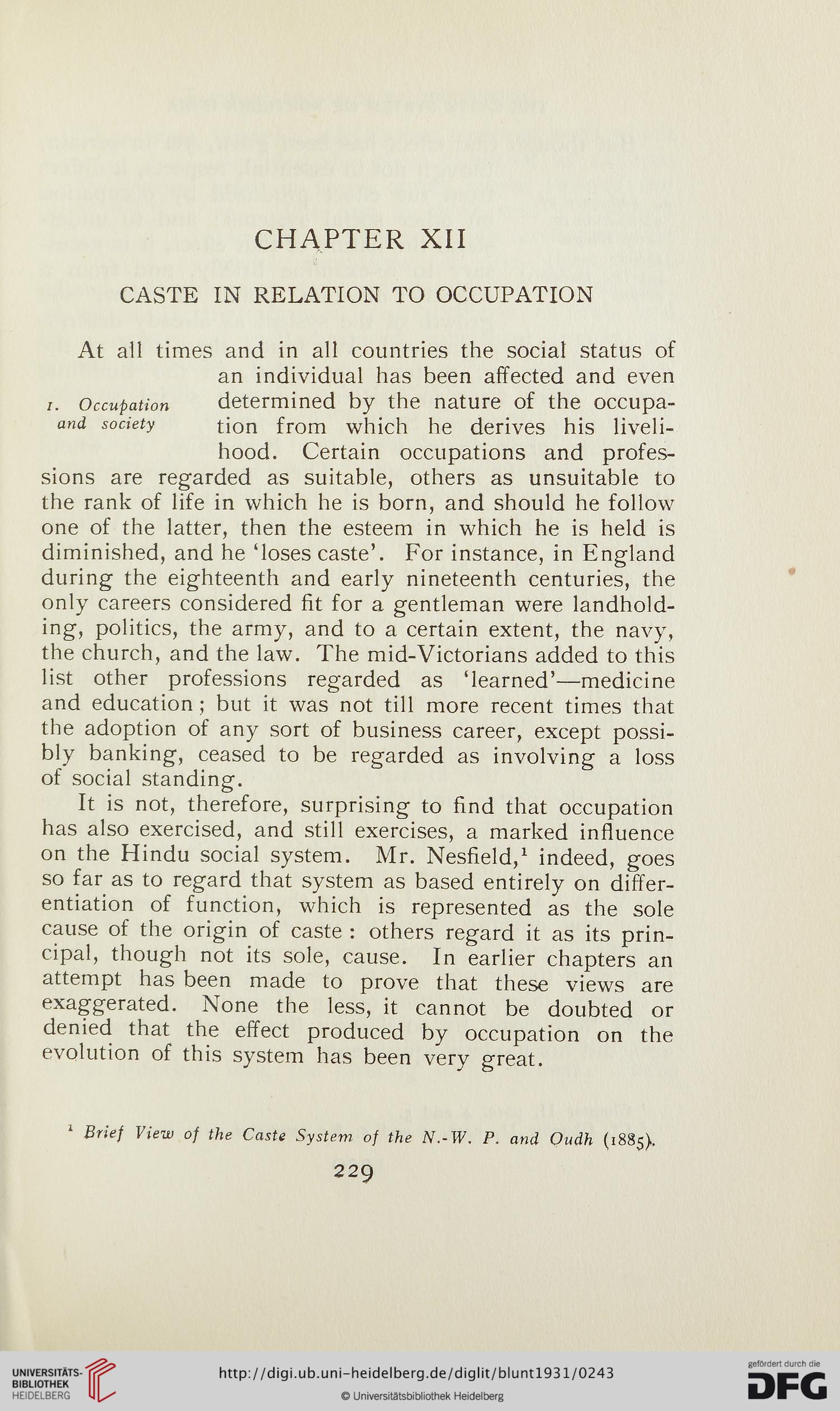CHAPTER XII
CASTE IN RELATION TO OCCUPATION
At ail times and in all countries the social status of
an individual has been affected and even
i. Occupation determined by the nature of the occupa-
and society tion from which he derives his liveli-
hood. Certain occupations and profes-
sions are regarded as suitable, others as unsuitable to
the rank of life in which he is born, and should he follow
one of the latter, then the esteem in which he is held is
diminished, and he ‘loses caste’. For instance, in England
during the eighteenth and early nineteenth centuries, the
only careers considered fit for a gentleman were landhold-
ing, politics, the army, and to a certain extent, the navy,
the church, and the law. The mid-Victorians added to this
list other professions regarded as ‘learned’—medicine
and education; but it was not till more recent times that
the adoption of any sort of business career, except possi-
bly banking, ceased to be regarded as involving a loss
of social standing.
It is not, therefore, surprising to find that occupation
has also exercised, and still exercises, a marked influence
on the Hindu social system. Mr. Nesfield,1 indeed, goes
so far as to regard that system as based entirely on differ-
entiation of function, which is represented as the sole
cause of the origin of caste : others regard it as its prin-
cipal, though not its sole, cause. In earlier chapters an
attempt has been made to prove that these views are
exaggerated. None the less, it cannot be doubted or
denied that the effect produced by occupation on the
evolution of this system has been very great.
1 Brief View of the Caste System of the N.-W. P. and Oudh (1885).
229
CASTE IN RELATION TO OCCUPATION
At ail times and in all countries the social status of
an individual has been affected and even
i. Occupation determined by the nature of the occupa-
and society tion from which he derives his liveli-
hood. Certain occupations and profes-
sions are regarded as suitable, others as unsuitable to
the rank of life in which he is born, and should he follow
one of the latter, then the esteem in which he is held is
diminished, and he ‘loses caste’. For instance, in England
during the eighteenth and early nineteenth centuries, the
only careers considered fit for a gentleman were landhold-
ing, politics, the army, and to a certain extent, the navy,
the church, and the law. The mid-Victorians added to this
list other professions regarded as ‘learned’—medicine
and education; but it was not till more recent times that
the adoption of any sort of business career, except possi-
bly banking, ceased to be regarded as involving a loss
of social standing.
It is not, therefore, surprising to find that occupation
has also exercised, and still exercises, a marked influence
on the Hindu social system. Mr. Nesfield,1 indeed, goes
so far as to regard that system as based entirely on differ-
entiation of function, which is represented as the sole
cause of the origin of caste : others regard it as its prin-
cipal, though not its sole, cause. In earlier chapters an
attempt has been made to prove that these views are
exaggerated. None the less, it cannot be doubted or
denied that the effect produced by occupation on the
evolution of this system has been very great.
1 Brief View of the Caste System of the N.-W. P. and Oudh (1885).
229




